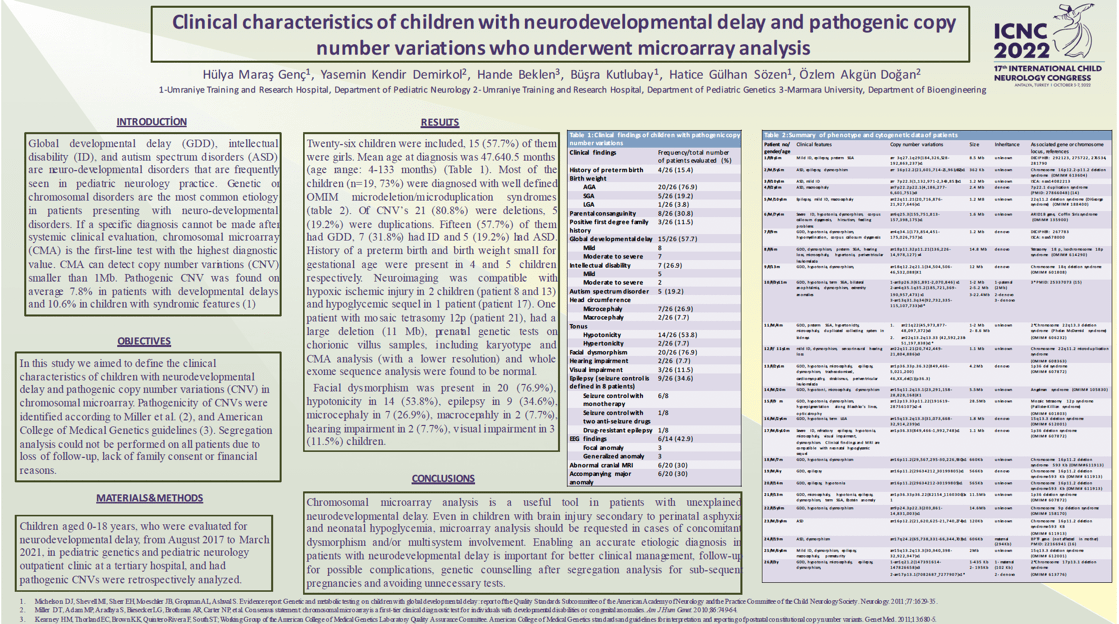Clinical characteristics of children with neurodevelopmental delay and pathogenic copy number variations who underwent microarray analysis
Hülya Maraş Genç, Yasemin Kendir Demirkol, Hande Beklen, Büşra Kutlubay, Hatice Gülhan Sözen, Özlem Akgün Doğan
Objectives: In this study we aimed to define the clinical characteristics of children with neurodevelopmental delay and pathogenic copy number variations (CNV) in chromosomal microarray. Methods: Children aged 0-18 years, who were evaluated for neurodevelopmental delay, from August 2017 to March 2021, in pediatric genetics and pediatric neurology outpatient clinic at a tertiary hospital, and had pathogenic CNVs were retrospectively analyzed. Results: Twenty-six children were included, 15 (57.7%) of them were girls. Mean age at diagnosis was 47.640.5 months (age range: 4-133 months). Most of the children (n=19, 73%) were diagnosed with well defined OMIM microdeletion/microduplication syndromes. Of CNV’s 21 (80.8%) were deletions, 5 (19.2%) were duplications. Fifteen (57.7%) of them had GDD, 7 (31.8%) had ID and 5 (19.2%) had ASD. History of a preterm birth and birth weight small for gestational age were present in 4 and 5 children respectively. Neuroimaging was compatible with hypoxic ischemic injury in 2 children and hypoglycemic sequel in 1 patient. Facial dysmorphism was present in 20 (76.9%), hypotonicity in 14 (53.8%), epilepsy in 9 (34.6%), microcephaly in 7 (26.9%), macrocepahly in 2 (7.7%), hearing impairment in 2 (7.7%), visual impairment in 3 (11.5%) children. Conclusion: Chromosomal microarray analysis is a useful tool in patients with unexplained neurodevelopmental delay. Even in children with brain injury secondary to perinatal asphyxia and neonatal hypoglycemia, microarray analysis should be requested in cases of concomitant dysmorphism and/or multisystem involvement.
Keywords: global developmental delay, intellectual delay, autism spectrum disorders, chromosomal microarray
Hülya Maraş Genç
Umraniye Training and Researc Hospital
Turkey
Yasemin Kendir Demirkol
Umraniye Training and Research Hospital
Turkey
Hande Beklen
Marmara University
Büşra Kutlubay
Umraniye Training and Research Hospital
Turkey
Hatice Gülhan Sözen
Umraniye Training and Research Hospital
Turkey
Özlem Akgün Doğan
Umraniye Training and Research Hospital
Turkey
Objectives: In this study we aimed to define the clinical characteristics of children with neurodevelopmental delay and pathogenic copy number variations (CNV) in chromosomal microarray. Methods: Children aged 0-18 years, who were evaluated for neurodevelopmental delay, from August 2017 to March 2021, in pediatric genetics and pediatric neurology outpatient clinic at a tertiary hospital, and had pathogenic CNVs were retrospectively analyzed. Results: Twenty-six children were included, 15 (57.7%) of them were girls. Mean age at diagnosis was 47.640.5 months (age range: 4-133 months). Most of the children (n=19, 73%) were diagnosed with well defined OMIM microdeletion/microduplication syndromes. Of CNV’s 21 (80.8%) were deletions, 5 (19.2%) were duplications. Fifteen (57.7%) of them had GDD, 7 (31.8%) had ID and 5 (19.2%) had ASD. History of a preterm birth and birth weight small for gestational age were present in 4 and 5 children respectively. Neuroimaging was compatible with hypoxic ischemic injury in 2 children and hypoglycemic sequel in 1 patient. Facial dysmorphism was present in 20 (76.9%), hypotonicity in 14 (53.8%), epilepsy in 9 (34.6%), microcephaly in 7 (26.9%), macrocepahly in 2 (7.7%), hearing impairment in 2 (7.7%), visual impairment in 3 (11.5%) children. Conclusion: Chromosomal microarray analysis is a useful tool in patients with unexplained neurodevelopmental delay. Even in children with brain injury secondary to perinatal asphyxia and neonatal hypoglycemia, microarray analysis should be requested in cases of concomitant dysmorphism and/or multisystem involvement.
Keywords: global developmental delay, intellectual delay, autism spectrum disorders, chromosomal microarray
Hülya Maraş Genç
Umraniye Training and Researc Hospital
Turkey
Yasemin Kendir Demirkol
Umraniye Training and Research Hospital
Turkey
Hande Beklen
Marmara University
Büşra Kutlubay
Umraniye Training and Research Hospital
Turkey
Hatice Gülhan Sözen
Umraniye Training and Research Hospital
Turkey
Özlem Akgün Doğan
Umraniye Training and Research Hospital
Turkey

Hülya Maraş Genç
Umraniye Training and Researc Hospital Turkey
Umraniye Training and Researc Hospital Turkey